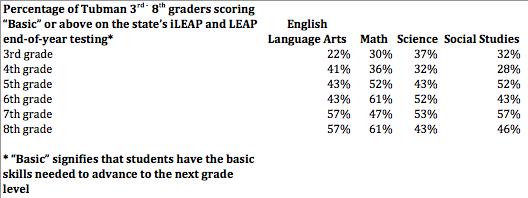The board that governs Harriet Tubman Charter School and the board that governs Akili Academy were merged at the Crescent City Schools’ June board meeting.
However, the Akili Academy board will still exist legally and will still meet monthly as a separate group at least until September. The board does not plan to officially give up its nonprofit status until it receives federal cash it’s owed.
Akili also won’t officially fall under the direction of Crescent City Schools, the charter management organization that runs Tubman, until July 1. The combined board will keep the Crescent City Schools name.
Board members, new and old, discussed these changes at the Crescent City Schools June board meeting. Additionally, they discussed Tubman’s state test scores and their application to charter Paul Habans Elementary School. The board also approved Tubman’s and Crescent City’s 2012-2013 budgets. For a full budget breakdown, click here.
Akili’s leaders are worried that if they dissolve their nonprofit organization too quickly, they won’t be able to get nearly $80,000 in federal reimbursement funds. They expect to get that cash in September, board member Bob Stefani said.
“We need to keep the entity associated with that tax ID number in place, so that we can collect the cash that’s coming in,” he said.
After that, they’ll close out the nonprofit.
The list of Akili board members joining the Crescent City Schools board are Tim Bryant, John Hummel, Mary Lee Murphy, Coleman Ridley, and Bob Stefani. That brings the number of board members to 12. After approving that action and a few others, board members turned their attention to Tubman’s state standardized test scores.
Here’s the breakdown of Tubman’s scores, as presented to board members:
Kate Mehok, Crescent City’s CEO, gave board members her explanation for the scores.
“You have the charter experiment, or charter system, growing for about four or five years now in New Orleans,” Mehok said. “And a lot of those students who have been in somewhat decent charter schools, like Akili, are starting to take the test in third and fourth grade. So across the city, third and fourth grade test scores are stronger than they’ve ever been, which is exactly what should be happening because we’re making a system change.”
Mehok suggested that students at Tubman have not had several years of experience under the same management. Crescent City Schools has only had control of Tubman for one year. Previously, the school had dismal academic performances when it was governed by the Algiers Charter School Association. The state revoked the association’s charter when the school’s scores didn’t improve.
Third grade scores were particularly low, Mehok said. To address that, Tubman will move some of its stronger second grade teachers to third grade. The school is also adding two interventionists to assist fourth grade education.
It’s hard to gauge what the scores mean in the context of what Crescent City is trying to do, board president JP Hymel said.
“The big challenge for me is [that] I don’t know what success looks like,” he said. “The goal is to take a school that was not performing, and in five years, turn it into a high performing school. Does that mean that we look at the giant strides we make between year one and year two?”
Hymel suggested that the board ask an expert how Tubman’s academic performance compares to other first-year turnaround schools. He also said that school leaders should be keeping thorough records of data, in order to one day become experts on turnaround work themselves.
Board members also discussed their application to charter Paul Habans, a school in Algiers run by the Recovery School District. Crescent City has already submitted its letter of intent to charter that school, Mehok said. The board will find out if it gets the charter in December.

